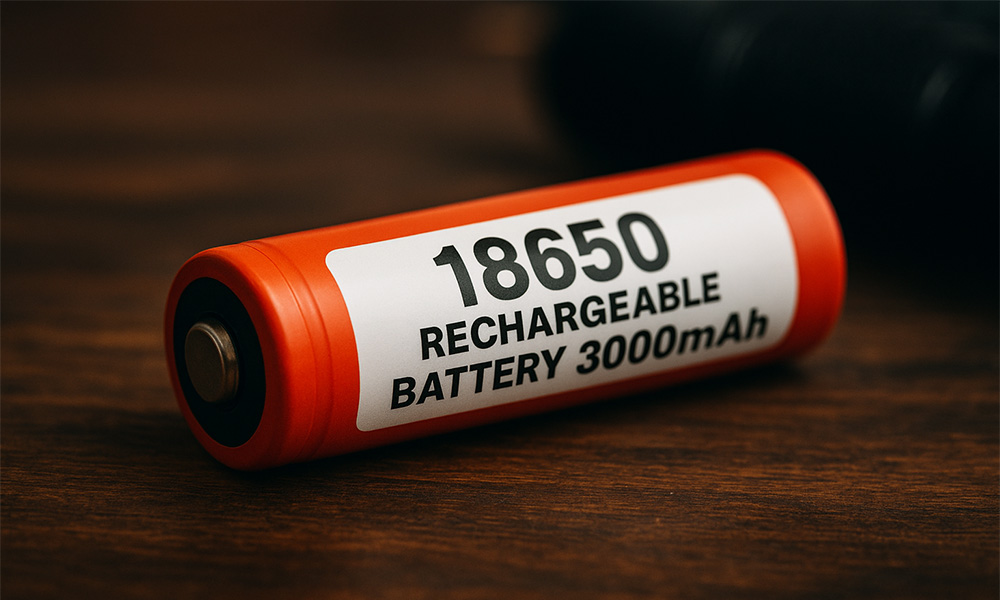Sometimes, a tiny battery can change the fate of an entire device.
A diving flashlight that keeps glowing 40 meters under the sea, an e-scooter that runs two extra kilometers in the cold wind, or a vape pen that still sparks up at midnight — behind all these moments hides a humble 18650 rechargeable battery 3000mAh.
1. The Number Isn’t the Whole Story
Almost every 18650 battery on the market says “3000mAh,” but that number only tells part of the story — capacity.
Just like two people with the same body weight don’t necessarily have the same strength.
Some batteries are designed for steady output, perfect for flashlights, cameras, or smart locks.
Others are built for high-drain bursts, powering drones, e-bikes, or power tools.
The difference? Discharge rate.

A “high-rate” battery can handle over 20 or 30 amps of discharge — think of it as muscle built for sprinting.
A regular one, if pushed that hard, overheats, swells, and dies prematurely.
2. Beyond Energy Density: Every Battery Has a Personality
Each battery has its own “personality”:
Some are tough, cycling hundreds of times without giving up;
Some charge fast but get hot easily;
Some perform steadily even in scorching conditions, like a marathon runner in the desert.
That comes down to the manufacturing craft — cell chemistry, protection circuitry, casing design.
Some use steel shells and pressure valves to prevent short circuits or impact damage.
Others include built-in protection boards to stop overcharging or deep discharge.
Those invisible details decide whether your battery survives extreme use or fails when it matters most.
3. Real-Life Stories
A diving instructor once told me his flashlight stayed bright underwater for more than two hours, and when he surfaced, the battery temperature was still stable.
That’s when I realized “good quality” isn’t just about capacity — it’s about not failing when you need it most.
Another guy I met, an e-bike enthusiast, used to build his own battery packs.
He first used cheap 18650s — within two months, they degraded and swelled.
Then he switched to high-drain 3000mAh cells. His ride distance increased, voltage stayed stable on uphill climbs, and performance felt smoother.
That’s the kind of difference you can feel — not just measure.
4. The Devil Is in the Details
Most people only look at capacity and forget about things like flat top vs button top.
That tiny detail can decide whether your battery even fits the device.
Some buyers realize too late that their “new batteries” don’t make contact properly.
Another easily overlooked point: protection circuits.
Skip them, and one over-discharge can ruin the whole cell.
And here’s a simple trick — experienced users often judge by weight.
If a 3000mAh cell feels unusually light, that’s a red flag.
Less material, less performance — it’s that simple.

5. 3000mAh Is Just the Beginning
The 3000mAh label is just the baseline.
Today, we already see 3500mAh or even 4000mAh models.
But as energy density increases, stability and safety become harder to maintain.
You either chase endurance or you choose balance — much like life itself.
In ideal use, a quality 18650 can handle over 500 charge cycles.
Treat it well — don’t overcharge or leave it fully drained — and it’ll last years.
Some DIY hobbyists even reuse old cells for portable solar power stations or home energy storage, giving these batteries a “second life.”
6. The Philosophy of a Battery
A battery, in many ways, is like a person.
Charge it too much, and it overheats.
Drain it too deeply, and it burns out early.
The healthiest state lies somewhere in the middle.
So next time you see a small 18650 rechargeable battery 3000mAh, don’t just stare at the label.
Think about the environment it’ll face, the load it must carry, and the cycles it will endure.
A battery’s true value isn’t in its printed number — it’s in how many times it’s been through the rhythm of being full and empty.


Leave a Reply